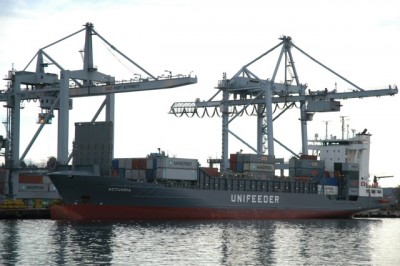A fierce labour battle has created severe indigestion among maritime employers, harbour workers in Oslo and their trade unions over the workers’ longstanding tradition of taking meal breaks together. The harbour comes to a standstill every day while workers head to the canteen, take out their sandwiches and enjoy what their employers are calling “the world’s most expensive lunch.”

Oslo harbour director Anne Sigrid Hamran churned up the debate in newspaper Aftenposten, which called for modernizing the current wage agreement for harbour workers who load and unload container ships. The agreement, dating back decades, gives workers the monopoly, or “prior right” to load and unload all of the cargo between the ships and the wharf, along with the right to take all their breaks together. Work in the harbour comes to a stop six times in every 24-hour period while workers gather to eat.
“Just imagine that you are standing in line for the security check-in at Gardermoen (site of Oslo’s major airport). Then you get the message that you have to wait half-an-hour while the security staff eats their matpakke (packed lunch). It’s just not part of modern-day worklife,” Hamran told Aftenposten.
Hamran argues that the wage agreement not only disrupts the harbour’s efficiency but also damages the competitiveness of maritime transport in general as an environmentally friendly alternative to transportation of goods by road. There’s been a major effort in recent months to move more cargo traffic over to ships, to relieve congestion on Norway’s inadequate road system.
Furious reaction
Hamran’s comments were met with fury by The Norwegian Transport Workers’ Union (NTF), with union leader Roger Hansen likening them to “defecating in your own nest” in a press release on Wednesday evening. He says that the real threat to sea transport is “social dumping.” Norwegian transport buyers are hiring foreign transport companies, which pay drivers monthly salaries of less than NOK 4500 (around USD 770), to transport goods by road within Norway, he argues.
Harbour workers receive a gross annual salary of up to NOK 600,000 (approx USD 100,000), with a basic salary of around NOK 350,000 that is supplemented by lucrative shift bonuses for evening, night and weekend work. Workers are currently expected to be available 24 hours a day, 7 days a week throughout the year. They put in, according to their employers, an average of 28.5 hours of actual work each week.
The harbour employers, along with national employers’ organization NHO and the shipping companies are offering a pay increase of 19 percent to the workers if they move over to working continuously, with staggered lunch breaks, so that work can continue without interruption.
Efficiency threatens workers’ benefits
Director Hamran argues that working continuously would make the harbour up to 25 percent more efficient, and mean that more of the work of loading and unloading could be finished during the daytime, instead of carrying on late into the evening and night as it does now. People living near Oslo’s new main container harbour at Ormsund, just southeast of central Oslo, currently have to put up with high levels of noise in the evenings from Norway’s biggest and busiest harbour operation.
The union has rejected the pay offer. Stig Skaug, spokesperson for the workers organized by NTF, argues that although the offer entails an increase in pay for daytime work, it means that their overall salary would decrease, because workers would be called for fewer evening and night shifts, which are better-paid.
“If the employers want us to work continuously, then they’ll have to employ more people,” Skaug told Aftenposten. Working continuously would, he believes, bring in a whole raft of problems. “We work outside all year round, whatever the weather, and need regular breaks in order to recover both physically and mentally,” he wrote on NTF’s own website. “Continuous work would mean that someone would have to take a break either right at the beginning or right at the end of every shift, and would then have long work shifts. That worries us in relation to the security at the harbour,” he wrote.
Oslo Harbour can trace its history back to 1735, making it one of Norway’s oldest businesses. As many as 70 cargo and passenger ships arrive at the harbour in an average week, with a lot of the cargo ships coming from Asia, via Rotterdam or Hamburg. Cargo includes wine, bicycles, coffee beans and juice concentrate.
Views and News from Norway/Elizabeth Lindsay
Please support our news service. Readers in Norway can use our donor account. Our international readers can click on our “Donate” button:

